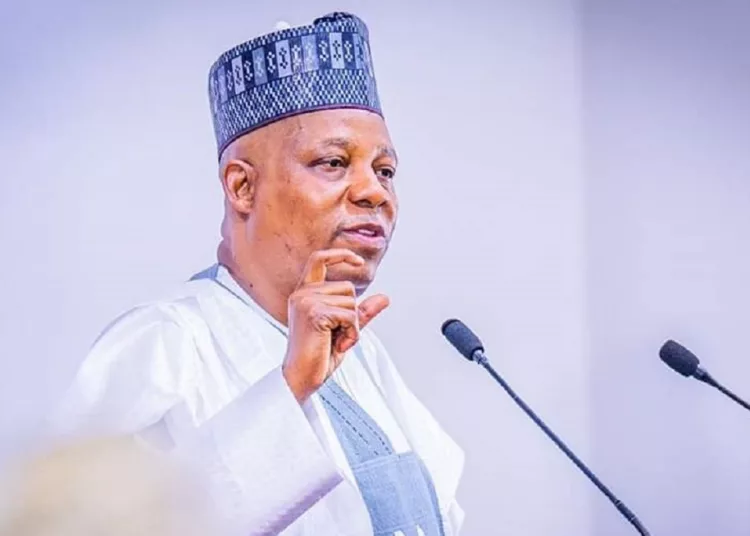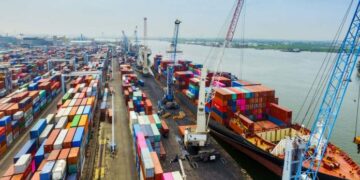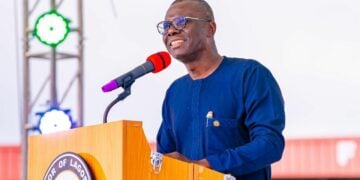Vice President Kashim Shettima and Governor of the Central Bank of Nigeria Olayemi Cardoso have set new targets for the Nigerian banking community to complement the government’s efforts for economic growth, job creation and MSMEs financing. The duo asked the banks to re-strategise and consolidate their role as catalysts for economic growth.
Speaking at the Bankers Committee Retreat in Abuja, the Vice President said “Our banks must consolidate their role as catalysts for economic growth and development. The development of banks should positively correlate with the development of the economy at large, and the robust profitability that we have seen in that sector should reflect – at least marginally – in the GDP growth numbers posted by the country at large. Indeed, we should be speaking about causality more than correlation. And we know that you are up to the task.”
Vice President Shettima believes that the availment of credit facilities to key productive sectors, facilitation and syndication of large ticket loans, and by taking a long-term view in their interactions with the market and the economy at large, the banks will help Nigeria to achieve a pass mark in the quest for economic growth and development.
Represented by the special adviser to President Tinubu on economic matters, Tope Fasua, the Vice President said the banking sector is perhaps the most critical ally to the government regarding the pursuit and achievement of the $1 trillion economy target. “We are not reneging or backtracking from this laudable objective, which may be able to raise our per capita GDP to over $4,000 from current levels of barely $1,000,” he stated at the event in Transport Hilton.
Speaking to the theme of the retreat: “Contract and Commitment to National Development and Economic Growth,” CBN Governor urged the bankers committee to devote the retreat to come up with ways to improve the business climate, create jobs, close skill gaps and build an inclusive economy.
He said they should focus on” What steps must we take to improve the business environment for all—large corporations, SMEs, and others? How can we better leverage public-private partnerships for infrastructure development? What are the most effective ways to close skill gaps in our workforce? How do we foster an ecosystem that nurtures and supports innovation? And, crucially, how can we reinforce our social contract with the Nigerian people to build a more inclusive economy?”
Cardoso said an array of topic experts has been mobilized to guide the participants through the different topics—from economic growth and development to innovation and capacity building.
He emphasised that the retreat is not merely a forum for dialogue; and that it is a call to action. “We are committed to implementing the actionable ideas and strategies that will emerge from our discussions. With the right people in this room and a shared vision, I am confident that we can drive meaningful progress,” he said.
Cardoso said the very high money supply Inflow that includes over N30 trillion Ways-and-Means and a dysfunctional economy his administration inherited at the apex bank created much challenge for the economy.
The Vice President used the opportunity to appeal strongly to the committee to urgently clear up thorny issues in the sector, some of which are impeding the efforts at financial and economic inclusion. “Nigerians complain bitterly that they are unable to access even minimal cash when most needed. There seems to have been some moral hazard and adverse selection problem with the involvement of street-side POS merchants. Nigerians complain about high and arbitrary charges and exploitation by rogue agents which we are sure you will be able to tackle, with concerted efforts,” Dr Fasua said.
He said there is a need for more initiatives towards the financing of MSMEs, and we urge you to continue to support the efforts of the federal government in the area of consumer credit culture.
Shettima acknowledged that the unification of the Naira which coincided with some weakening in the local currency has spurred some behavioral adjustments among Nigerians. He said the development has forced Nigerians to cut back on some foreign travels while foreign education has slowed down to the extent that many foreign universities are feeling the pains.
He said there is now more focus on local educational institutions and many world-standard facilities have now debuted in Nigeria. “The weakening of the naira has also resulted in a spike in exports as the Marshall-Lerner principle in economics has kicked in for Nigeria — that a nation is likely to see an increase in exports and gain from currency devaluation if exports are price elastic.”





